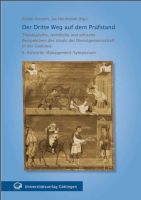Der Dritte Weg auf dem Prüfstand - Theologische, rechtliche und ethische Perspektiven des Ideals der Dienstgemeinschaft in der Diakonie
Contributor(s)
Anselm, Reiner (editor)
Hermelink, Jan (editor)
Collection
AG UniversitätsverlageLanguage
GermanAbstract
For risks and side effects ask your doctor, pharmacist - or the Clinical Ethics Committee in your environment." The establishment of clinical ethics committees is a direct response to the professionalization of the medical establishment and the achievements in medical technology. Always progress in medicine was more than just technological advance. Especially its undeniable successes face doctors, nurses, chaplains and the management at the same time with new questions and problems. With the institutionalization of clinical ethics consultation connects the expectation of understanding the complex processes on a common basis. What taks are set for ethics committees in hospitals? How becomes ethic an issue there? And how do theologians and nurses communicate in these bodies? These papers summarize from a theological and philosophical point of view central research findings discussed in the framework of the DFG-funded research project "Ethics and Organisation. Seit der Entstehung eines Pflege- und Gesundheitsmarktes steigt der Kostendruck in der Diakonie. In dieser Situation stehen sich kirchliche MitarbeiterInnen als Arbeitnehmer und als Arbeitgeber gegenüber. Beide Seiten sehen sich aufgefordert, bei der Verteilung von knapper werdenden Mitteln und Beschäftigungschancen gerecht und effizient zugleich zu handeln. Ist dieser Spagat im kirchlichen Arbeitsrecht machbar? Sorgt z.B. das Paritätsprinzip im kirchlichen Arbeitsrecht für Akzeptanz auch dann, wenn Widersprüche nicht vollständig ausgeglichen werden können? Mit dem „Dritten Weg“ stehen auch die Kirchen selbst als Arbeitgeber auf dem Prüfstand. Damit geraten die arbeitsrechtlichen Regelungen in einen erweiterten Horizont. In der Diskussion zu kurz gekommen ist bisher eine theologische Klärung der Frage, wie das Leitbild der „Dienstgemeinschaft“ in einer modernen, pluralistischen Gesellschaft überhaupt auf Organisationen zu übertragen ist. Angesichts ökonomischer Verteilungskonflikte, Veränderungen des diakonischen Berufsethos und nachhaltigen Betreuungserfordernissen hilfesuchender Menschen stellt sich die Frage, wie Diakonie nicht nur organisierbar, sondern im christlichen Sinne auch lebbar ist.
Keywords
canon law; business organization; church; German church law; Arbeitsrecht; Diakonie; Ethik; Evangelische Kirche in Deutschland; TarifvertragDOI
10.17875/gup2006-379ISBN
3938616563OCN
808384695Publisher
Universitätsverlag GöttingenPublication date and place
2006Classification
Religion and beliefs
Theology


 Download
Download Web Shop
Web Shop